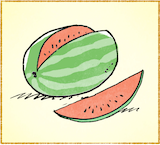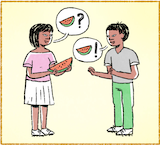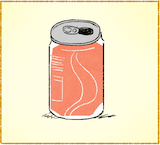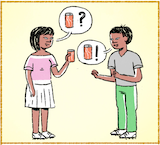




นี้คืออี่หยัง นี้คือแตงโม
แตงโมน่วยสีเขียว เนี้ยแตงโมกะเป็นสีแดง
แตงโมมีจักน่วย แตงโมมีน่วยเดียวแม่นบ่ แม่น แตงโมมีน่วยเดียว มีน่วยเดียวข้อหล้อ
เขาผ่าแตงโมน่วยนี้ไป่ ผ่าแล้ว เขาผ่าแตงโมน่วยนี้แล้ว
เขาผ่าออกเป็นซิ้นเดียวแม่นบ่ แม่น เขาผ่าออกไปแล้วซิ้นเดียว ซิ้นน้อยๆ หนึ่ง
เปียกแตงโมสีอี่หยัง เปียกแตงโมสีเขียว
แล้วเนี้ยแตงโมเป็นสีอี่หยัง เนี้ยแตงโมเป็นสีเหลียง
แตงโมมีเม็ดพ้อม เม็ดมันสีดำ เม็ดมันน้อยๆ หนึ่ง เม็ดมันเม็ดบ่ใหญ่
แตงโมลดซาดจั่งใด ลดซาดสิหวานๆ แต่หวานบ่สู้น้ำตาน กะสิหวานแบบพอดี
แล้วคนมักกินแตงโมบ่ กะมักอยู่ คนส่วนหลายสิกินแตงโมอยู่ เพาะว่าแตงโมมันแซบ ซื้อได้หลายที่ เพาะว่าล้านขายแตงโม หลือล้านขายผนละไม้ สิมีขายอยู่หลายที่หลายหม้อง
17
พุหญิงคนนี้เขากำลังเฮ็ดหญัง พุหญิงคนนี้เขากำลังสิซวนพุซายกินแตงโมบ่ เขาถามพุซายว่า กินแตงโมบ่ แล้วเขากะสิยื่นแตงโมให้พุซายกิน
มีแตงโมอยู่ในมือเขาซิ้นหนึ่ง ซิ้นบ่ใหญ่หลาย ซิ้นพอดี
แล้วพุซายได้ญินจากพุหญิงว่า กินแตงโมบ่ แล้วเขาได้ญิน เขาอาดสิตอบว่า กินอยู่คับ กินกะได้คับ เขากะเลยสิเอามือของเขาไปยื่นแตงโมจากพุหญิงคนนี้
18
นี้คืออี่หยัง นี้คือกะปอง กะปองน้ำอัดลมแม่นบ่ แม่น อันนี้เป็นกะปองน้ำอัดลม
น้ำอัดลมมันหวานบ่ หวานอยู่ น้ำอัดลมมันหวานหลาย มันเฮ็ดมาจากน้ำตาน เพาะสะนั้นแล้วมันกะต้องหวาน
กะปองน้ำอัดลมเปิดจั่งใด มันสิมีฝาเปิด หลือหม้องเปิดของมัน เปิดง่ายๆ เปิดได้บ่ญาก
น้ำอัดลมซื้อได้อยู่ใสแน่ ซื้อได้หลายหม้อง ซื้อได้หลายที่ ซื้ออยู่ในห้างกะได้ ซื้ออยู่ในตะหลาดกะได้ ซื้ออยู่ในเซเว้นกะได้
น้ำอัดลมมันแซบบ่ กะแซบอยู่ คนส่วนมากเขาสิกินน้ำอัดลม ขั้นกินไปแล้ว มันสิสดซื้น มันสิคายความฮ้อนได้ดี
19
พุหญิงคนนี้ เขากำลังซวนพุซายกินน้ำอัดลมบ่ เขาถามพุซายว่า กินน้ำอัดลมบ่
เขาถือน้ำอัดลมกะปองหนึ่ง กะปองสีแดง กะปองบ่ใหญ่หลาย แล้วเขากะซวนพุซายกิน
พุซายได้ญินจากพุหญิงว่า กินน้ำอัดลมบ่ พอเขาได้ญิน เขากะเลยตอบไปว่า กินอยู่คับ กินกะได้คับ เขากะเลยสิเอามือของเขาไปยื่นน้ำอัดลมจากพุหญิงนี้
20
เขากำลังเฮ็ดหญัง พุหญิงคนนี้เขากำลังถือบ่าดอยู่ หลือถือลูกบอนอยู่
เขากำลังสิซวนพุซายคนนี้ อาดสิถามว่า เหล้นบ่าดบ่ เหล้นบ่าดนำกันบ่
แล้วพุซายได้ญิน พุซายอาดสิตอบไปว่า เหล้นอยู่คับ เหล้นกะได้คับ
ขั้นเขาเหล้นนำกันแล้ว มันสิม่วนบ่ กะอาดสิม่วนอยู่ กะอาดสิม่วนบักคักหนึ่ง เพาะว่าได้เหล้นนำกัน มันได้มีหมู่
พุซายได้ถือบ่าดบ่ บ่ พุซายบ่ได้ถือบ่าด พุหญิงเป็นคนถือบ่าด ถือบ่าดลูกสีส้ม มีสีขาวปนพ้อม ลูกบ่ใหญ่หลาย
พุหญิงใส่กะโปงสีอี่หยัง พุหญิงใส่กะโปงสีขาวแม่นบ่ แม่น พุหญิงใส่กะโปงสีขาว กะโปงบ่ญาว กะโปงสั้นๆ หนึ่ง
แล้วพุซายใส่กางเกงสีหญัง พุซายใส่กางเกงสีเขียว เป็นกางเกงขาญาว
Link to overview page
Link to dictionary
| Isaan | Pronunciation | Tones | Thai | English/Notes |
|---|---|---|---|---|
| นี้ | ni: | HF | นี้ | 1. this 2. here |
| คือ | khʉ: | HR | คือ | 1. to be, to resemble, like, as 2. why {บักหล้าคือบ่เก็บโต่ะแน่ = [addressing a young boy] Why haven't you cleared the table?} |
| อี่หยัง | i:-yaŋ | H-M | อะไร | 1. what {นี้คืออี่หยัง = What is this?} {มื้อนี้เจ้าเฮ็ดอี่หยัง = What are you doing today?} {กินเข้างายกับอี่หยัง = What did you have for breakfast?} 2. something, anything, (in negations) nothing {บ่ต้องเฮ็ดอี่หยังอีกเลยนอกจากใส่ปุย = [we] don't need to do anything besides adding fertilizer} |
| แตงโม | tɛ:ŋ-mo: | M-HR | แตงโม | watermelon |
| น่วย | nu:ai | H | ลูก, ผล | clf. for the fruits (e.g., banana, coconut, lime, papaya, watermelon), vegetables (e.g., chilis), eggs, mountains, the sun |
| สี | si: | M | สี | 1. color 2. colored pencil, crayon |
| เขียว | khi:ao | M | เขียว | green |
| เนี้ย | ni:a | HF | เนื้อ | meat Notes: pronunciation: also realized as เนื้อ |
| กะ | ga | M | ก็ | 1. then, consequently 2. also |
| เป็น | pen | M | เป็น | 1. to be, to exist 2. to be able to 3. to suffer, sth. happens to 4. เป็นหญัง[...]คือ in initial position: why? {เป็นหญังเขากะคือแปงฟัน = Why is he brushing his teeth?} {เป็นหญังเคี่ยงบินมันคือสิตก = Why is the airplane falling down?} |
| แดง | dɛ:ŋ | M | แดง | red |
| มี | mi: | HR | มี | 1. to have 2. there is |
| จัก | jak | M | จัก | 1. answer to a question: [I] don't know, don't know exactly, [I'm] not sure {พุซายคนนี้เขาเถ้าไป่ จัก จักเถ้าหลือบ่เถ้า เบิ่งบ่ค่อยออก = Is this man here already old? I don't know. I can't see clearly whether he's old or not.} {เขาเว้ากันอยู่ใส จักคือกัน = Where are they talking? I don't know either.} 2. exact(ly), what exactly {จักต้มอี่หยังกะบ่ฮู้ = I don't know what (exactly) he is cooking} {บ่ลู้คือกันจักปาอี่หยัง = I don't know either what kind of fish this is} 3. how much/many? {ต้นไม้มีจักต้น = How many trees are there?} {ตอนนี้จักโมงแล้ว = What time is it now?} {มือของเฮานี้สิมีจักนิ้ว = How many fingers do our hands have?} 4. a bit, a little bit {จักหน่อย/จักหน่อยหนึ่ง = a bit, a little bit} |
| เดียว | di:ao | M | เดียว | only, alone, single |
| แม่นบ่ | mɛ:n-bɔ: | H-H | ใช่ไหม | question particle: ..., right? ..., isn't it? ..., don't you? etc. {เจ้าได้เห็นสิ่งนั้นแม่นบ่ = You've seen that, haven't you?} {ฝนกำลังตกแม่นบ่ = It's raining, isn't it?} {นี้คือกะคุแม่นบ่ = This is a bucket, isn't it?} |
| แม่น | mɛ:n | H | ใช่ | 1. yes 2. affirmative particle |
| ข้อหล้อ | khɔ:-lɔ: | LF-LF | เท่านั้น, ขนาดนั้น, น้อยๆ | only {ต้นไม้มีต้นเดียว ต้นเดียวข้อหล้อ = there's one tree, only one tree} {มีบ้านหลังเดียวข้อหล้อ = there's only one house} |
| เขา | khao | M | เขา | personal pronoun: he, she |
| ผ่า | pha: | H | ผ่า | 1. to flash (lightning) {ฟ้าผ่ามันผ่ามันสิเสียงดังคัก = when a flash of lightning flashes, it's very loud} 2. to cut lengthwise, to cut open {เขาผ่าแตงโมน่วยนี้ไป่ = Has he cut this watermelon yet?} {เขากำลังผ่าบักพ้าว = she's cutting the coconut open} 3. to cross through, to go across |
| ไป่ | pai | H | หรือยัง | question particle: yet {เขาข้ามสะพานไป่ = Has he crossed the bridge yet?} {เขากินเข้าแล้วไป่ = Has he finished eating yet?} {กินเข้าไป่? บ่ทันกิน = Have you eaten yet? Not yet.} |
| แล้ว | lɛ:o | HF | แล้ว | 1. finished 2. already 3. and then, and next (especially แล้วกะ) 4. auxiliary for past tense |
| ออก | ɔ:k | LF | ออก | 1. to go out, to leave 2. out |
| ซิ้น | sin | HF | ชิ้น | 1. piece, slice 2. skin {หนีบซิ้น = to pinch the skin} |
| ไป | pai | M | ไป | 1. to go 2. auxiliary indicating action extending into the future |
| น้อย | nɔ:i | HF | น้อย | 1. few, little 2. small |
| หนึ่ง | nʉŋ | H | หนึ่ง | 1. one 2. after adjective: intensifier {บักคักหนึ่ง = very much} {อันบักใหญ่หนึ่ง = very large}, or attenuates the meaning {กะดาดมันแผ่นน้อยๆ หนึ่ง = the piece of paper is [relatively] small} |
| เปียก | pi:ak | LF | เปลือก | shell, peel, outer skin Notes: pronunciation: also realized as เปือก |
| เหลียง | li:aŋ | M | เหลือง | yellow |
| เม็ด | met | H | เม็ด | 1. seed, stone, kernel, grain 2. raindrop {เม็ดฝน = raindrop} 3. clf. for buttons {กะดุมเม็ดนี้ = this button} |
| พ้อม | phɔ:m | HF | พร้อม | at the same time, also, too {มีตะเว็นพ้อม = the sun's out, too} {กะทะมีด้ามพ้อม = the pan has also a handle} |
| มัน | man | HR | มัน | it (also used to refer to people) |
| ดำ | dam | M | ดำ | 1. black 2. to transplant rice seedlings {ดำนา = to transplant rice seedlings} |
| บ่ | bɔ: | H | ไม่ | 1. no, not 2. question particle, transforming a statement into a question Notes: spelling exception in line with common usage on social media |
| ใหญ่ | ɲai | H | ใหญ่ | large, big |
| ลดซาด | lot-sa:t | H-HF | รสชาติ | taste Notes: pronunciation: also realized as ลดชาด |
| จั่งใด | jaŋ-dai | H-M | ยังไง, แบบไหน | how, in what manner {บักนาวมันมีลดซาดจั่งใด = Lime fruits have what kind of taste?} {เขาปิดแอจั่งใด = How is he switching off the A/C?} {เทียนใซ้จั่งใด = How's a candle used?} {สิใซ้จั่งใด = how is [it] used?} |
| สิ | si | M | จะ | future tense auxiliary {เขากำลังสิตื่น = he's about to wake up} {สิไปตะหลาด = [I'm] going to the market} |
| หวาน | wa:n | M | หวาน | sweet |
| แต่ | tɛ: | H | แต่ | 1. but {แต่บ่ต่างกันหลาย = but not very different} {แต่บ่ลู้ว่าเขาญ่างมาแต่ใส = but [I] don't know where he's coming from, see also: แต่ว่า} 2. only {ตอนนี้มีแต่ขี้ฝ้า = now there are only clouds} |
| สู้ | su: | LF | สู้ | บ่สู้: not better/more than, to be not as ... as {[แตงโม] หวานบ่สู้น้ำตาน = [watermelon] is not as sweet as sugar} |
| น้ำตาน | na:m-ta:n | HF-M | น้ำตาล | sugar |
| แบบ | bɛ:p | LF | แบบ | 1. example, model, kind 2. style, form, pattern, design |
| พอดี | phɔ:-di: | HR-M | พอดี | 1. to fit well 2. appropriate, just enough, just right {กะจกบานบ่ใหญ่ กะจกบานพอดี = not a large window, just right} {พอดีมือของเฮา = just right for his hand} 3. just in time, at the right moment, just this moment {แล้วพุซายคนนี้กะญ่างมาพอดี = and the man has come just now} |
| คน | khon | HR | คน | person, people |
| มัก | mak | H | ชอบ | to like, to love, to want, to desire |
| กิน | gin | M | กิน | to eat, to consume, to use |
| อยู่ | yu: | H | อยู่ | 1. to be (located) at 2. yet, still 3. auxiliary indicating continuous or progressive action {ทอดปาอยู่ในกะทะ = (in the process of) frying a fish in the pan} {แม่กำลังเมี้ยนเฮียนอยู่ = mother is cleaning/tidying up the house} |
| ส่วนหลาย | su:an-la:i | H-M | ส่วนมาก | 1. mostly, mainly 2. many, a majority (of people) |
| เพาะว่า | phɔ-wa: | H-H | เพราะว่า | because |
| แซบ | sɛ:p | HF | อร่อย | 1. food: tasty {กวยเตียวมันแซบบ่ = Is the noodle soup tasty?} 2. sleep: well {เป็นตานอนแซบคัก = it looks as if she's sleeping very well} |
| ซื้อ | sʉ: | HF | ซื้อ | to buy |
| ได้ | dai | HF | ได้ | 1. can 2. to get, to obtain 3. before verb: indicating past tense 4. บ่ได้ + verb: not |
| หลาย | la:i | M | เยอะ, มาก | many, much, very |
| ที่ | thi: | H | ที่ | 1. in/at {ที่นี้= here} 2. place {สิมีขายอยู่หลายที่หลายหม้อง = it is being sold in many places} {ที่นอน = sleeping place} 3. clf. for places |
| ล้าน | la:n | HF | ร้าน | shop {ล้านขายผนละไม้ = shop selling fruits} {ล้านขายเสี้ยผ้า = clothes shop} |
| ขาย | kha:i | M | ขาย | to sell |
| หลือ | lʉ: | M | หรือ | or |
| ผนละไม้ | phon-la-mai | M-H-HF | ผลไม้ | fruit |
| หม้อง | mɔŋ | LF | ที่, แห่ง, บริเวณ | 1. place, area {หลายที่หลายหม้อง = in many places} {หม้องใดหม้องหนึ่ง = some place} 2. clf. for places |
| พุหญิง | phu-ɲiŋ | H-M | ผู้หญิง | woman, female |
| กำลัง | gam-laŋ | M-HR | กำลัง | auxiliary indicating continuous or progressive action |
| เฮ็ด | het | H | ทำ | to do, to make |
| หญัง | ɲaŋ | M | อะไร, เป็นหญัง = ทำไม | 1. what {เขากำลังเฮ็ดหญัง = What is he doing?} {ธูปเอาไว้เฮ็ดหญัง = What are incense sticks for?} 2. something, anything, (nothing) 3. เป็นหญัง[...]คือ in initial position: why {เป็นหญังเขาคือใส่บักพิกลงไปในกวยเตียว = Why is he putting chili in [his] noodle soup?} {เป็นหญังหน้าต่างมันคือเปิด = Why is the window open?} {เป็นหญังมันคือมีควนไฟ = Why is there smoke?} |
| ซวน | su:an | HR | ชวน | to invite {เขาซวนพุซายเหล้นบ่าด = (s)he invites the boy to play basketball} |
| พุซาย | phu-sa:i | H-HR | ผู้ชาย | man, male |
| ถาม | tha:m | M | ถาม | to ask |
| ว่า | wa: | H | ว่า | 1. that, as {คำว่า X = the word X} 2. to say |
| ยื่น | yʉ:n | H | ยื่น | to hand sth. to so., to stretch out one's hand, to reach out for {เขากะสิยื่นแตงโมให้พุซายกิน = she hands the boy watermelon to eat} |
| ให้ | hai | LF | ให้ | 1. to give {หมอกำลังเอายาให้คนป่วยกิน = the doctor is giving the patient medicine} 2. for 3. to allow, to be allowed |
| ใน | nai | HR | ใน | in, within |
| มือ | mʉ: | HR | มือ | 1. hand 2. front leg/paw (e.g., of a cat) |
| ได้ญิน | dai-ɲin | HF-HR | ได้ยิน | to hear |
| จาก | ja:k | LF | จาก | 1. from {... เฮ็ดมาจากอี่หยัง = ... is made from what?} 2. to depart |
| อาด | a:t | LF | อาจ | 1. might, may, will 2. likely |
| ตอบ | tɔ:p | LF | ตอบ | to answer, to respond, to reply |
| คับ | khap | H | ครับ | male politeness particle |
| เลย | lə:i | HR | เลย | 1. futher on, beyond, past {เข็มน้อยเลยเลขสิบสองไป = the minute hand has passed number twelve} 2. too much 3. at all 4. definitively 5. completely, utterly |
| เอา | ao | M | เอา | to take, to give {เขากำลังเอาก่องไปซั่ง = he's taking the boxes to weigh them} {หมอกำลังเอายาให้คนป่วยกิน = the doctor is giving medicine to the patient} {เอาไว้ถ้า = is for, is used for, has the purpose of} |
| ของ | khɔ:ŋ | M | ของ | of, belonging to |
| กะปอง | ga-pɔŋ | M-M | กระป๋อง | can |
| น้ำอัดลม | na:m-at-lom | HF-M-HR | น้ำอัดลม | soft drink |
| อัน | an | M | อัน | 1. thing, object 2. general clf. for objects |
| มา | ma: | HR | มา | 1. to come 2. auxiliary expressing action towards the present or focal time {กะคุเฮ็ดมาจากอี่หยัง = What is the bucket made of?} {แล้วเขากะเก็บเงินจากพุนั้นมา = and then she takes the money of that person} |
| เพาะสะนั้นแล้ว | phɔ-sa-nan-lɛ:o | H-M-HF-HF | เพราะฉะนั้นแล้ว | therefore, for that reason, consequently Notes: pronunciation: also realized as เพาะฉะนั้น |
| ต้อง | tɔŋ | HF | ต้อง | to have to, must |
| เปิด | pə:t | M | เปิด | 1. to open {เปิดหน้าต่าง = to open the window} {เปิดปะตู = to open the door} 2. to start, to switch on {เปิดไฟ = to switch on the light} {เปิดแอ = to switch on the A/C} |
| ฝา | fa: | M | ฝา | 1. lid {ฝากะปุก = lid of a jar/pot} 2. wall {ฝาบ้าน = wall (of a house) = กำแพงบ้าน} |
| ง่าย | ŋa:i | H | ง่าย | easy, simple, clear |
| ญาก | ɲa:k | HF | ยาก | difficult, hard |
| ใส | sai | M | (ที่)ไหน | 1. where? {สิไปใส = Where are [you] going?} {มาแต่ใส = Where are [you] coming from?} {กะทะอยู่ใส = Where's the pan?} 2. somewhere, anywhere {ใสกะได้ = anywhere, wherever you like} |
| แน่ | nɛ: | H | แน่, บ้าง | 1. some, somewhat 2. final particle, used to ask for examples (similar to Thai บ้าง at the end of a question) {หม้อใซ้เฮ็ดอี่หยังได้แน่ = What (different things) can a pot be used for?} {น้ำอัดลมซื้อได้อยู่ใสแน่ = Where/in which places can one buy soft drinks?} 3. final particle, when giving examples {มีเทิงส้งแน่ มีเสี้ยแน่ มีเกิบแน่ = there are trousers, shirts, shoes etc.} 4. final particle, used to give a command {ไปปิดหน้าต่างให้แน่ = Close the window!} 5. final particle, acting as an intensifier, especially in the pattern ... คัก ... แน่ {สูงคักสูงแน่ = very high} {ญ้องเฮาคัก ญ้องเฮาแน่ = [he's] praising me a lot} |
| ห้าง | ha:ŋ | LF | ห้าง | shop, shopping mall |
| ตะหลาด | ta-la:t | M-LF | ตลาด | market |
| เซเว้น | se:-wen | HR-HF | เซเว่น | 7/11 (supermarket chain in Thailand) |
| ส่วนมาก | su:an-ma:k | H-HF | ส่วนมาก | mostly, usually, generally |
| ขั้น | khan | LF | เมื่อ | when, if |
| สดซื้น | sot-sʉ:n | M-HF | สดชื่น | fresh, refreshed Notes: pronunciation: also realized as สดชื้น |
| คาย | kha:i | HR | คลาย | to relieve, to alleviate, to ease {คายความฮ้อน = to get relief from the heat, to cool down} |
| ความฮ้อน | khwa:m-hɔ:n | HR-HF | ความร้อน | heat Notes: pronunciation: also realized as ความล้อน |
| ดี | di: | M | ดี | good |
| ถือ | thʉ: | M | ถือ | 1. to hold 2. to carry 3. to regard as, to consider {สี่สิบองสาถือว่าฮ้อน = 40 degrees Celsius is considered hot} |
| พอ | phɔ: | HR | พอ | 1. just when, just after, as soon as 2. enough, adequate |
| บ่าด | ba:t | H | บาสเกตบอล | basketball |
| ลูกบอน | lu:k-bɔ:n | HF-M | ลูกบอล | ball |
| เหล้น | len | LF | เล่น | 1. to play, to enjoy oneself with, to do something for pleasure {เหล้นลูกบอน = to play ball} {เหล้นเกม = to play a game/games} {เหล้นน้ำ = to play with/in the water} {นั่งเหล้น = to sit} {กินเหล้น = to eat (as a snack), to snack} {เหล้นโน่ดบุ่ก = to use a laptop (for entertainment or work)} 2. to drop by, to spend time with, to come to visit {บ่ได้มาเฮ็ดหญัง มาเหล้นซื่อๆ = I've not come to do anything in particular, I'm just dropping by} |
| นำกัน | nam-gan | HR-M | together, jointly, with one another {บ่สามาดใซ้นำกันได้ = can't be used together} {เขากำลังญ่างนำกัน = they are walking together} {เหล้นบ่าดนำกันบ่ = Shall we play basketball?} | |
| ม่วน | mu:an | H | สนุก, ม่วน | happy, amusing, fun |
| บักคักหนึ่ง | bak-khak-nʉŋ | M-H-H | intensifier: very, very much (variant of คัก) | |
| หมู่ | mu: | H | หมู่, กลุ่ม(เพื่อน) | 1. group, friend(s) 2. children (in a family) {ลูกคนที่ออกมาก่อนหมู่ = the first-born child} {น้องสุดหมู่ = last-born child} 3. collective noun: group, many |
| ลูก | lu:k | HF | ลูก | 1. child 2. clf. for balls, fruits (lime), mountains |
| ส้ม | som | LF | ส้ม | 1. fruit: orange 2. color: orange |
| ขาว | kha:o | M | ขาว | white |
| ปน | pon | M | ปน | to mix, to mingle, to blend |
| ใส่ | sai | H | ใส่ | 1. to put something in/on {เขาใส่บักพิกในกวยเตียวหลาย = he's putting a lot of chili in his noodle soup} {เขาบีบยาสีฟันใส่แปงสีฟัน = he squeezes toothpaste on the toothbrush} {ก่องเอาไว้ใส่ของ = boxes are there to put stuff in} 2. to wear (clothes) {เขาใส่เสี้ยแขนญาว = he's wearing a long-sleeve} 3. directed at {เอิ้นใส่กัน = to call each other/to say to each other} {หมามันเห่าใส่แมว = the dog barks at the cat} {ล้องเพงใส่ไม = to sing into the microphone} {เขากำลังซี้มือไปใส่พุซาย = she's pointing at the man} |
| กะโปง | ga-po:ŋ | M-M | กระโปรง | skirt Notes: see also สิ้น |
| ญาว | ɲa:o | HR | ยาว | long |
| สั้น | san | LF | สั้น | short |
| กางเกง | ga:ŋ-ge:ŋ | M-M | กางเกง | trousers Notes: synonym: ส้ง |
| ขา | kha: | M | ขา | leg {ขาหน้า = front leg} {ขาหลัง = hind leg} {ส้งขาญาว = long trousers} |